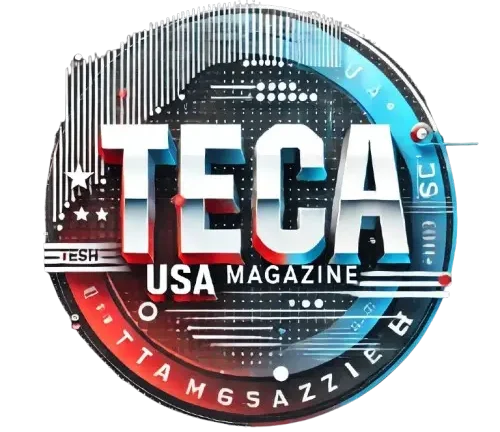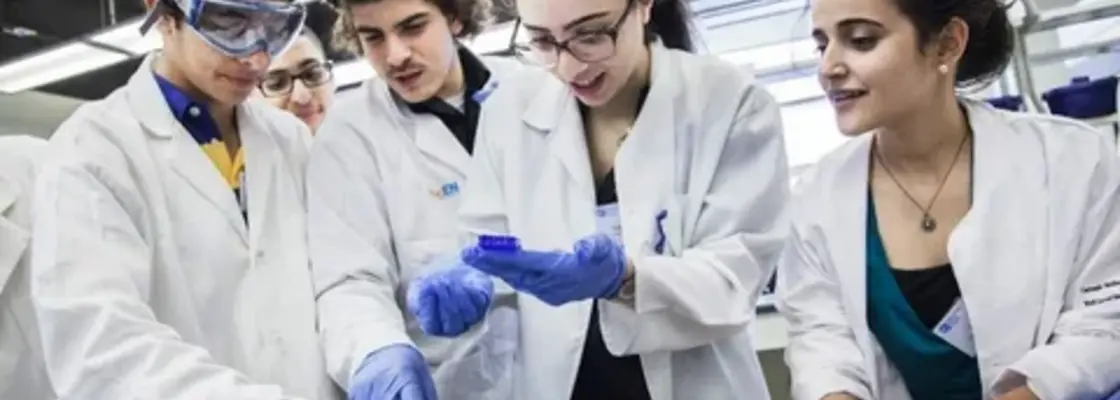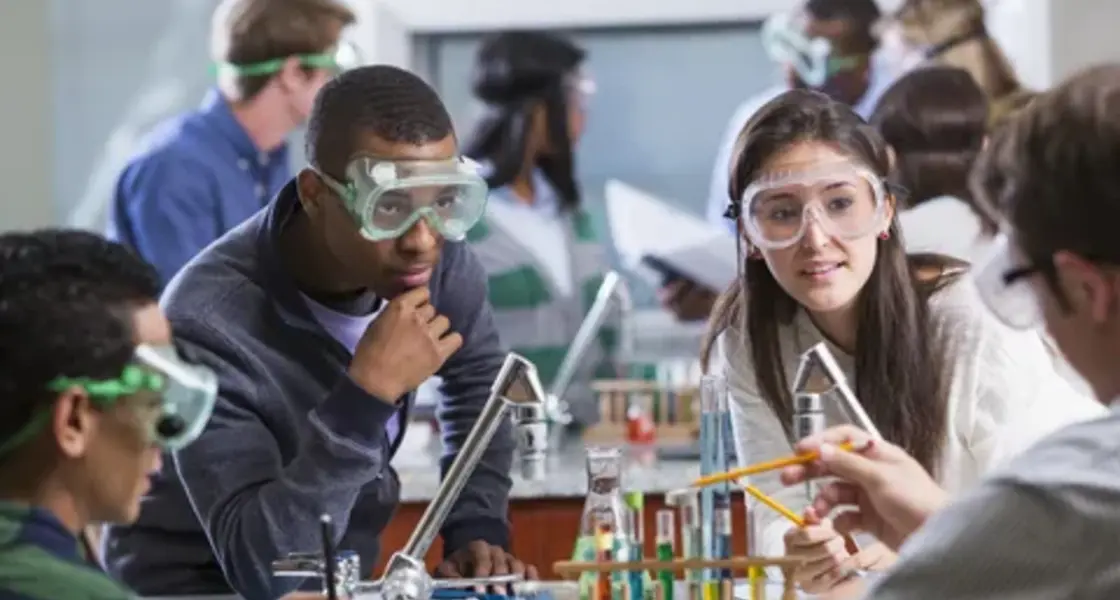Biotech in High School may appear like a course where students play with elaborate technology but there’s so more.
The key is understanding the way that biology intersects technology. Imagine creating medicine as well as engineering crops, or even figuring out sustainable solutions to global issues.
This isn’t only for science geeks. This is for anyone who’s interested in how the life sciences can be used to solve real-world problems.
What exactly is biotech in high school? And what is the significance of it?
Let’s get started to find out.
Why Biotech Is Showing Up in High Schools
It is happening everywhere rapidly.
From the groundbreaking COVID-19 vaccine to meat grown in labs Biotechnology Biotech in High School at center of the innovation process.
Biotech in High School are aware of this and are incorporating biotech into their classrooms providing students with the knowledge to grasp the future and shape it.
What students learn:
- Learning hands-on using cutting-edge tools.
- The ability to think critically and solve complicated issues.
- An advantage in fields like agriculture, healthcare and environmental science.
What Exactly Is Biotech in High School?
At its heart, during Biotech in High School is all about the use of technology and biology to develop solutions.
Here’s how it’s broken dowBiotech in High Schooln:
1. The Basics of Biotech
Students study the fundamental science and chemistry concepts such as cells and DNA structures.
Instead of studying textbooks, they employ:
- Machines for PCR to amplify DNA.
- Gel Electrophoresis to analyze genetic material.
- Micropipettes for precise tests.
2. Real-Life Applications
Biotech in High School classes aren’t limited to the theory. They are able to tackle real-world problems for example:
- How can we engineer bacteria to help clean up oil spills.
- How to plant resistant to drought.
- The development of diagnostic tools for illnesses.
3. Career Exploration
Biotech courses at high school introduce students to fields that include:
- Research in biomedicine.
- Genetic engineering.
- Biomanufacturing.
What Makes High School Biotech Different?
Let’s face it The science department in high school often is accused of being boring.
Biotech in High School alters the rules.
Here’s how:
1. Lab-Centered Learning
Forget lectures. The majority of Biotech in High School classes are focused on the actual work.
Students carry out experiments, study the results, and sometimes even help troubleshoot as professional scientists.
2. Collaboration with professionals
Certain schools collaborate with local Biotech in High School companies or universities.
Students may work in labs, take part in workshops, or attend lectures by industry experts.
3. Focus on Innovation
It’s not about memorizing facts. It’s about using your imagination and thinking critically to tackle global issues.
Why Should Students Care About Biotech in High School?
Let’s face it: Biotech isn’t just for future researchers.
1. It’s a Gateway to Lucrative Careers
Biotech in High School is booming and there is a the demand for skilled employees.
Students who begin early gain an advantage in areas such as:
- Biomedical engineering.
- Pharmaceuticals.
- Environmental science.
2. It’s About Solving Real Problems
Biotech students don’t just learn, they help contribute to the field.
They could be:
- Create green solutions that are sustainable.
- Find out about genetic diseases.
- Develop new ways to improve food security.
3. It’s Cool!
It’s true that messing around with DNA and constructing bacteria is much better than writing essays on mitosis.
How Schools Are Teaching Biotech
Some schools don’t have the full biotech lab however, many are taking steps to improve.
Here’s how they go about it:
1. Specialized Programs
Certain colleges offer biotech education as a part of an Career and Technical Education (CTE) path.
These programs typically contain:
- Lab-based courses.
- Biotech-related certifications.
- Internships at biotech companies.
2. Electives and Clubs
In schools with no full-time program, biotech is usually available as an option.
Clubs such as Science Olympiad or STEM clubs may also consider biotech-related projects.
3. Partnerships
Schools collaborate with companies and universities to provide mentorships, resources and exposure to the real world.
FAQs About Biotech in High School
1. What is biotech and what does it mean in high school?
High school biotech classes combine science and technology to help students solve real-world problems by conducting hands-on experiments and utilizing innovative thinking.
2. Are biotech and biotechnology difficult to master for students in high schools?
It’s not easy, but it’s not difficult or impossible. Teachers break down complicated concepts into easily digestible lessons, and using hands-on methods makes learning enjoyable and exciting.
3. Do students require a basic background in science?
Not necessarily. Although having knowing a little bit about biology is helpful, the majority of programmes are designed for teaching all subjects starting from scratch.
4. Biotech could lead to employment and education possibilities?
Absolutely! Biotech opens the door to college and internship programs and lucrative careers in agriculture, medicine and many other fields.
5. Do all high schools provide biotech?
But it’s expanding rapidly. A lot of schools are adding courses as the demand for biotech professionals grows.
The Future of Biotech in High Schools
Biotech is more than just a class; it’s a mental.
Students who enroll in these courses don’t just learn sciences. They’re getting ready to face global health challenges, sustainability, and technological.
As more schools embrace biotech programs, we’ll be seeing an influx of new innovative individuals who are ready to shape the future.
If you’re asking whether it’s worth pursuing biotech during high school The answer is easy it is definitely.
It’s a perfect blend of creativity, curiosity and potential. Who wouldn’t want to be a part of it?
Biotech: A Gateway to the Future
Biotechnology isn’t just a science class. It’s a way to launch students who wish to be a part of the solution.
If it’s dealing with global issues such as climate change, or locating solutions to diseases Biotech provides the students of high schools with practical technology and the knowledge to think differently.
This is the truth: every sector is changing due to biotech. From producing lab-grown beef to making biofuels, the possibilities are limitless. Schools that offer biotech aren’t just teaching, they’re training students to become innovators in a rapidly evolving field.
How Biotech Changes Education
The traditional science education usually is focused on memorization and theories. Biotech alters the rules by making science more interactive and focused on career development.
Students aren’t just passive learners. They’re also researchers, problem-solvers and even creators. This is how biotech can transform education:
1. Fosters Curiosity
Students don’t simply learn about DNA, they actually play with it. Through hands-on activities like taking DNA and altering bacteria’s genes are what make science more real and thrilling.
2. Teaches Problem-Solving
Biotech helps students think in a critical manner. When it comes to designing experiments or resolving lab issues They learn skills that transcend the walls of their classroom.
3. Bridges the Gap Between School and Industry
By working with biotech companies and universities Students gain firsthand exposure to professional environments. These relationships often result in mentoring opportunities or internships.
Real-Life Impact of High School Biotech
Students who study biotech aren’t just learning but also make a difference.
For instance:
- Designing Solutions to Local Issues Students work on projects that involve engineering bacteria, for example, to cleanse water sources that are polluted within their communities.
- Participating in national competitions: Biotech students typically compete in science fairs, or programs such as iGEM (International Genetically Engineered Machine) in which they tackle global issues using creative solutions.
- Recognizing Schools: Schools that have strong biotech programs typically place its students on the map, which opens opportunities for grants and acceptance into colleges.
The Skills You Learn in Biotech
Biotech courses don’t just educate you about science. They also build essential life skills that can be used in any field of work.
Here’s what you’ll be left with:
1. Lab Skills
You’ll be able to master tools such as micropipettes, centrifuges and spectrophotometers.
2. Data Analysis
The process of analyzing laboratory results helps you understand complex information, a skill that all industries value.
3. Teamwork and Communication
A majority of biotech research projects involve collaboration, which teaches how to work as groups and communicate your results effectively.
4. Creativity
Biotech isn’t only about tackling problems, it’s also about thinking outside of the box to discover creative solutions.
Careers Biotech Opens Up
Biotech isn’t just another high school course, it’s a pathway to some of the most thrilling career paths.
If you’re contemplating where your biotech experience will take you, here’s a few alternatives:
- Biomedical Engineer: Create therapeutic devices and treatments for patients.
- Genetic Counselors: They can help families to understand the genetic causes of their ailments.
- Agriculture Scientist: Develop sustainable farming practices.
- Environmental Biotechnologist Engineer solutions to cut down on pollution.
- Pharmaceutical Researcher: Develop life-saving medications and treatments.
What are the schools doing to innovate using Biotech
Biotech is now more accessible than ever before. Schools are coming up with innovative ways to incorporate it into their curriculums even if they do not have laboratories worth millions of dollars.
1. Virtual Labs
By using virtual simulations online, learners are able to test biotech methods without costly equipment.
2. Partnerships
Many schools join forces with local biotech firms to offer students the opportunity to do internships or gain access to technologically advanced facilities.
3. Cross-Disciplinary Learning
Biotech is often a cross-pollination with other disciplines, such as computers (bioinformatics) or environmental science allowing students to receive a an education that is well-rounded.
Challenges in High School Biotech
While biotech has incredible potential however, it’s not without obstacles:
- Limited Access Schools do not all have the resources available to offer biotech-related programs.
- Cost Materials and lab equipment can be costly.
- Teachers Training requires qualified educators to teach specialization.
However, a lot of schools and groups are working to help make biotech more accessible through grant programs, and shared resource sharing.
FAQs About High School Biotech
Q: What are you do in a biotech class?
You’ll conduct research, analyze DNA, and discover how to utilize cutting-edge lab tools. Expect a mixture of chemistry, biology and technology.
Question: Are Biotech in High School careers just for students with an interest in careers in science?
Nope! The skills you learn–problem-solving, data analysis, teamwork–are valuable in any career.
Question: Is it possible to be a part of biotech programs but my school doesn’t have it?
Find online courses, summer camps, or local STEM-related organizations. There are many opportunities to learn outside of the classroom.
Q: Are Biotech in High School classes in high school a challenge?
It’s a bit challenging, but doable. The majority of programmes are made to cover everything starting from the very beginning.
Are there any Biotech in High School-related scholarships?
Yes! Numerous biotech firms and institutions offer scholarships to students who are pursuing careers in science.
Biotech in High School: More Than a Class
High school biology is more than simply studying genes or learning about bacteria.
It’s about shaping the future.
From developing eco-friendly solutions to curing diseases Biotech places students on the frontline of the global revolution.
If you are a student who is interested in sciences, or simply wanting to have an impact, biotech is the ideal place to start.
Also, whether your institution offers a full-time program or just one class, take a dive.
The knowledge you’ll acquire and the doors you’ll be able to open are well worth it.


